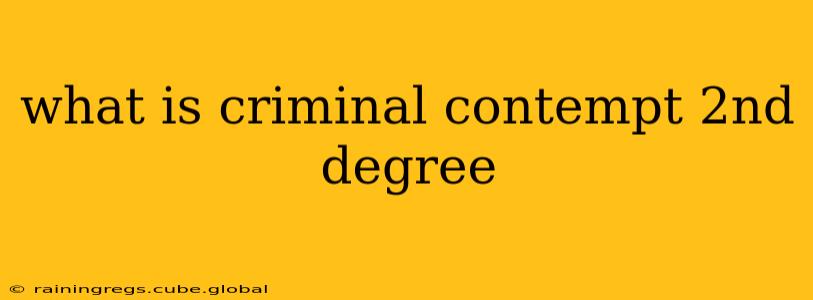What is Criminal Contempt Second Degree?
Criminal contempt of court, specifically in the second degree, is a serious offense that involves obstructing or interfering with the administration of justice. It's crucial to understand that the specifics of second-degree criminal contempt vary significantly by jurisdiction (state or federal). There's no single, universally applicable definition. This means the penalties and the exact actions constituting this crime will differ depending on where the alleged offense occurred.
This article will provide a general overview, highlighting common elements and emphasizing the need to consult local laws and legal professionals for precise details.
Understanding the Core of Criminal Contempt
Contempt of court, in its broadest sense, is any action that shows disrespect or disregard for the authority of a court. It's designed to protect the integrity of the judicial system and ensure the fair and efficient administration of justice. Contempt can be categorized as either civil or criminal.
-
Civil contempt is typically aimed at compelling someone to comply with a court order. For example, if a parent refuses to pay child support as ordered, they could be held in civil contempt. The focus is on coercing compliance, usually through fines or imprisonment until compliance is achieved.
-
Criminal contempt, on the other hand, is a punishment for actions that obstruct or impede the court's ability to function. It's not about compelling action but about punishing the affront to the court's authority. Second-degree criminal contempt usually falls under this category.
Common Elements of Second-Degree Criminal Contempt
While the specifics vary, second-degree criminal contempt typically involves acts that are less serious than those constituting first-degree criminal contempt. These acts might include:
-
Disobeying a court order: Failing to comply with a legally valid court order, although this is often considered a separate offense depending on the nature of the order (a direct versus indirect contempt).
-
Disruptive behavior in court: This could involve outbursts, threats, or other actions that disrupt the proceedings. The level of disruption and the intent behind it will greatly influence whether it's considered second-degree criminal contempt.
-
Interfering with witnesses: Attempting to intimidate, coerce, or otherwise interfere with a witness's testimony can lead to contempt charges.
-
Falsifying evidence: Submitting false or misleading evidence to the court constitutes a serious offense.
-
Tampering with court documents: Altering, destroying, or concealing court records is a blatant disregard for judicial authority.
Penalties for Second-Degree Criminal Contempt
The penalties for second-degree criminal contempt can range significantly. Possible punishments may include:
-
Fines: Monetary penalties imposed for the offense.
-
Jail time: Imprisonment for a specified period, usually shorter than that for first-degree contempt.
-
Community service: Performing a certain number of hours of unpaid work in the community.
-
Probation: A period of supervised release with conditions that must be met.
How is it different from First-Degree Criminal Contempt?
First-degree contempt typically involves more serious actions, directly aimed at obstructing justice, often with the intent to undermine the court's authority. Examples include assaulting a court official or forcibly taking someone from court custody. This distinction often involves the level of intent and the severity of the disruption caused.
Frequently Asked Questions
H2: What are some examples of actions that might constitute criminal contempt of court (second degree)?
Examples might include refusing to answer relevant questions under oath (if ordered by the court), persistently interrupting court proceedings, or making credible threats against a judge or court officer outside the courtroom. Each action is judged by the court based on its severity and the intent of the actor.
H2: What is the difference between direct and indirect contempt?
Direct contempt is an act of defiance that occurs in the presence of the court, such as interrupting a judge during a hearing. Indirect contempt involves an act of defiance that happens outside the courtroom, like failing to comply with a court order. Second-degree contempt can involve both direct and indirect actions.
H2: Can I represent myself in a criminal contempt case?
While you have the right to self-representation, it's highly recommended you seek legal counsel. Criminal contempt charges are serious and can have significant consequences. An attorney specializing in criminal law can provide the necessary expertise to protect your rights.
H2: What are the potential defenses against a charge of criminal contempt?
Potential defenses might include a lack of knowledge of the court order, inability to comply due to circumstances beyond your control, or a claim that the court order itself was invalid or improperly issued. These defenses must be carefully crafted and presented by an experienced attorney.
Disclaimer: This information is for educational purposes only and should not be considered legal advice. The specifics of criminal contempt laws vary widely. If you are facing criminal contempt charges, immediately seek the advice of a qualified legal professional in your jurisdiction.
